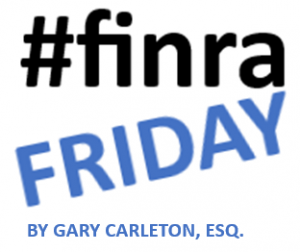
Welcome to #FINRAFriday!
This Blog, written by Gary Carleton at Carleton Law PLLC, breaks down the mysteries of the FINRA investigative and disciplinary process so that those of you who are facing scrutiny by the regulator are better prepared to defend yourself. In each posting, we explore a small piece of the process and explain how it impacts FINRA and brokers. After each Blog, we all welcome your comments and experiences to share with others.
This Week: Understanding the Significance of FINRA’s Limited Jurisdiction
This week we start #FINRAFriday, with the basics, JURISDICTION. While we spend a lot of time focused on who IS subject to its jurisdiction, here, we explore the limits to which FINRA can compel the production of information. Who is beyond FINRA’s authority? Many people don’t realize that FINRA is not the government and its access to investigative information is quite limited.
Generally, FINRA Enforcement can require that brokerage firms and those that work at firms provide documents and other information in accordance with FINRA Rule 8210. Its authority to compel documents and testimony from a broker continues for two years after the broker is no longer registered with a firm. But absent the filing of an amended Form U-5 that discloses potential new misbehavior, that is the limit of its ability to compel production of documents or information.
What does that mean? While FINRA can attempt to get third-party documents from a registered broker, like his phone records, it cannot compel customers, banks, attorneys, estate executors, phone companies, non-broker public companies, stock transfer companies, government agencies such as the IRS, or many others, to provide information or appear for on-the-record interviews. Even registered investment advisors who are not associated with a FINRA member are beyond its reach.
Why is that important? FINRA often has investigations where the critical information needed to establish a potential violation and bring a disciplinary case is simply beyond its reach. Understanding FINRA’s limits in collecting information can be valuable in negotiating a resolution.
Because it cannot compel customers to provide information, FINRA places a high priority on finding and keeping a credible, cooperating customer. In seeking customer cooperation, customers typically ask what it is they have to gain by going through the experience. FINRA counsel cannot make any promises to the customer since that decision is not always in Enforcement’s control.
FINRA is also limited in what documents it can get from brokerage firms. Really? How is that? It is enough to know for this blog that FINRA and the SEC impose obligations for firms to maintain certain critical records for a period of time – after which most firms have an aggressive procedure of disposing of records. For example, order tickets, which are completed by brokers and given to firm traders to buy and sell for customers, includes a lot of important information about a specific trade. While most of the information on the ticket is transferred to other recordkeeping systems, the order tickets only needs to be kept for three years. After that, firms are not required to maintain the files and often discard them.
Knowing the limits of the information that FINRA Enforcement can compel is just the first critical element when determining how best to defend yourself or your client in an investigation. If you’ve had an experience that you are willing to share, we welcome you to leave a comment. You may also send a private message to Carleton Law at info@carletonlaw.net.
Next Time -We dive deeper into FINRA’s investigative process. There’s lots to discuss. Stay safe and see you next time.
About Carleton Law PLLC
For more than 30 years before opening this firm, Gary Carleton, Principal at Carleton Law, was the one conducting complex investigations and bringing disciplinary actions at FINRA and SEC. Now, Carleton Law PLLC brings all that savvy experience to bear to advocate for brokers and FINRA firms who find themselves in that dreaded position of facing FINRA scrutiny. Carleton Law focuses on the individual needs of each client to guide them through the maze of the investigative and disciplinary process.
Carleton Law PLLC | 1015 15th Street NW, Washington, DC 20005 | info@carletonlaw.net
The information provided in this article does not, and is not intended to, constitute legal advice; instead, all information is for general informational purposes only. Readers of this article should contact their attorney to obtain advice with respect to any particular legal matter. No reader should act or refrain from acting on the basis of information contained herein without first seeking legal advice from counsel in the relevant jurisdiction. Only your individual attorney can provide assurances that the information contained herein – and your interpretation of it – is applicable or appropriate to your particular situation. Use of, and access to, this article does not create an attorney-client relationship between the reader or user and the article author or law firm.
